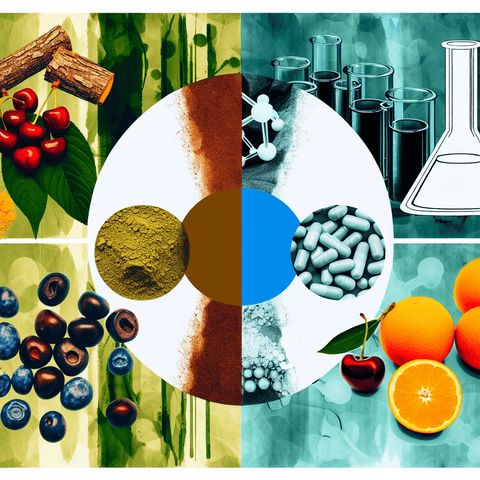Introduction
In the quest for optimal health, many individuals turn to supplements to fill the nutritional gaps in their diets. However, the debate between the efficacy and safety of natural versus synthetic supplements is ongoing. With a plethora of options available, understanding the differences, risks, and benefits is crucial for making informed decisions. This comprehensive guide delves into the complexities of natural versus synthetic supplements, shedding light on which might be safer for your health.
Understanding Natural Supplements
Natural supplements are derived from whole food sources and are minimally processed, ensuring that they retain the majority of their naturally occurring nutrients. These supplements are often preferred by those seeking a more holistic approach to health. The primary advantage of natural supplements is their bioavailability, which means they can be more easily absorbed and utilized by the body compared to their synthetic counterparts.
For example, natural vitamin C, which can be sourced from foods like oranges or acerola cherries, comes with a variety of bioflavonoids and co-factors that might enhance its absorption and efficacy. This contrasts with synthetic vitamin C, or ascorbic acid, which lacks these additional components. While there is ongoing research, some studies suggest that the additional compounds in natural vitamin C might contribute to its antioxidant properties, which help in boosting immunity and protecting against oxidative stress. For more information on vitamin C and its benefits, visit this page.
The Science Behind Synthetic Supplements
Synthetic supplements are created in laboratories through chemical processes that mimic the natural nutrient. They are often more cost-effective and accessible than natural supplements. However, the concern with synthetic supplements lies in their potential lack of bioavailability and the presence of artificial additives or fillers that can cause adverse reactions in some individuals.
Despite these concerns, synthetic supplements can still play a crucial role in addressing nutritional deficiencies, especially in cases where natural sources are not readily available. For instance, synthetic vitamin D, often found in fortified foods and supplements, is vital for maintaining bone health and supporting the immune system. To explore more about vitamin D, its sources, and safety, you can visit this resource.
Weighing the Risks of Natural Supplements
While natural supplements are generally perceived as safe, they are not without risks. The primary concern is the potential for contamination with heavy metals, pesticides, or other harmful substances during the cultivation and processing stages. Moreover, natural supplements may vary significantly in potency and concentration, leading to inconsistent dosing.
It is crucial to select natural supplements that have been rigorously tested and certified by reputable organizations to ensure purity and potency. Consumers should also be aware of the possibility of allergic reactions to certain natural ingredients. Consulting with healthcare professionals before starting any supplement regimen is advised, to personalize the approach based on individual health needs and conditions.
Potential Hazards of Synthetic Supplements
Synthetic supplements, although beneficial, can pose certain risks, particularly due to the presence of artificial ingredients, preservatives, and colorings. These additives can trigger allergic reactions or gastrointestinal discomfort in sensitive individuals. Furthermore, high doses of certain synthetic supplements can lead to toxicity, especially fat-soluble vitamins like vitamins A, D, E, and K, which accumulate in the body.
It's essential to adhere to recommended dosages and to be cautious of any adverse effects. Regular monitoring and consultation with healthcare providers can help mitigate these risks. Synthetic supplements should be selected with care, focusing on brands known for their quality and transparency in ingredient sourcing.
Exploring the Benefits of Natural Supplements
Natural supplements offer a host of benefits, primarily due to their synergistic composition. Many natural supplements provide a full spectrum of nutrients, which can work together to enhance absorption and effectiveness. For instance, magnesium sourced from whole foods can aid in energy production, muscle function, and bone health, often more efficiently than its synthetic counterparts. To learn more about magnesium benefits, visit this link.
Additionally, natural supplements are often free from synthetic chemicals and preservatives, reducing the risk of adverse reactions. They are a preferred choice for individuals with sensitivities or those following a clean lifestyle.
Advantages of Synthetic Supplements
Synthetic supplements have their place in modern nutrition, particularly when specific nutrients are needed in higher concentrations than what can be obtained through diet alone. They are typically more stable, have a longer shelf life, and can be produced in precise dosages, which is crucial for addressing certain health conditions or deficiencies.
For example, omega-3 fatty acids like DHA and EPA are often sourced from fish oil, but synthetic versions can provide these essential nutrients without the risk of oceanic contaminants. For more details on omega-3 supplements, check out this page.
Choosing the Right Supplement for Your Needs
When deciding between natural and synthetic supplements, it is important to consider personal health goals, dietary restrictions, and potential allergies. A balanced approach often involves integrating both types of supplements, depending on the nutrient requirements and health conditions.
Factors such as age, lifestyle, and existing medical conditions should guide the choice of supplements. Consulting with healthcare professionals can provide personalized recommendations that prioritize safety and efficacy.
Conclusion
The choice between natural and synthetic supplements is not always clear-cut, as both have their unique benefits and potential risks. Understanding the differences and considering personal health needs is essential in making informed decisions. Whether opting for natural or synthetic, the primary goal should remain the same: to safely and effectively support overall health and well-being.
Q&A Section
-
Are natural supplements always safer than synthetic ones?
Not necessarily. While natural supplements are often perceived as safer due to their minimal processing, they can still pose risks such as contamination. It's important to choose high-quality, certified products. -
Can I take synthetic supplements without any side effects?
While many people tolerate synthetic supplements well, some may experience side effects, particularly if consuming high doses or if sensitive to artificial additives. -
What factors should I consider when choosing a supplement?
Consider factors such as bioavailability, personal health goals, dietary restrictions, and potential allergies. Consulting with a healthcare provider can also offer guidance tailored to your needs. -
Is it possible to overdose on supplements?
Yes, particularly with fat-soluble vitamins and minerals. Adhering to recommended dosages and consulting with healthcare professionals is advised. -
Are there supplements that should only be taken in natural form?
Some individuals may prefer natural forms for certain nutrients due to personal beliefs or health conditions. However, both natural and synthetic forms can be effective if chosen and used appropriately.
Important Keywords
Natural supplements, synthetic supplements, bioavailability, vitamin C, vitamin D, magnesium benefits, omega-3 supplements, supplement safety, natural vs synthetic, nutritional supplements.



